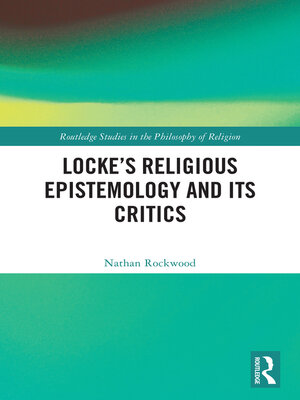Locke's Religious Epistemology and Its Critics
ebook ∣ Routledge Studies in the Philosophy of Religion
By Nathan Rockwood

Sign up to save your library
With an OverDrive account, you can save your favorite libraries for at-a-glance information about availability. Find out more about OverDrive accounts.
Find this title in Libby, the library reading app by OverDrive.



Search for a digital library with this title
Title found at these libraries:
| Library Name | Distance |
|---|---|
| Loading... |
This book offers a sustained defense of Locke's religious epistemology. It puts Locke into conversation with leading figures in contemporary religious epistemology and shows that Locke's views are more plausible than many philosophers of religion and epistemologists realize.
Locke has become the villain in contemporary religious epistemology. In recent years, Locke has often been singled out and criticized for insisting that religious belief requires evidence and for failing to provide adequate evidence that would support rational belief in God and Christianity. This book defends a broadly Lockean religious epistemology. The author argues that we need evidence for religion and that there is good evidence supporting belief in God and Christianity. He discusses Locke's views on the evidence from natural theology, religious experience, the testimony of miracles, and scripture. In each chapter, the author contrasts Locke's view on a type of evidence with one of his critics: Michael Bergmann, David Hume, Alvin Plantinga, Richard Swinburne, and Linda Zagzebski. At the end of each chapter, the author shows how a Bayesian analysis of evidence can support Locke's evidence for religious belief, specifically a belief in Christianity. This defense of Locke's position shows how his religious epistemology continues to be relevant in contemporary debates.
Locke's Religious Epistemology and Its Critics is a historically informed contribution to religious epistemology. It will appeal to researchers and graduate students working in epistemology, philosophy of religion, and history of philosophy.







